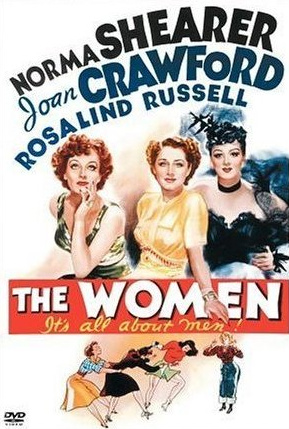The Women, 1939
Starring: Norma Shearer, Joan Crawford, Rosalind Russell, and Joan Fontaine
Synopsis (from NetFlix):
George Cukor directs an all-female cast in this catty tale about battling and bonding that was edgy for its time — and is considered the ultimate women’s movie of the 1930s. Norma Shearer, Joan Crawford, Rosalind Russell and other Hollywood leading ladies are among the array of husband-snatchers, snitches and lovelorn ladies who argue and gossip about each other at astonishing breakneck speed throughout the film.
My Thoughts (NO spoilers 🙂 ):
I’ve received some critiques regarding the length of my posts, so I am going to try to be brief and get to the ethical punch with this post and cut out the plot points and summary that could ruin it for those who haven’t seen the movie. All plot issues I do discuss stem from what is seen in the first 5 minutes so do not worry. I haven’t seen the remake, though I’d like to when it comes out on DVD, but I’m told that most of it is the same, except the ending due to the changes in US divorce law since 1939.
The first thing one would notice in this film is the fact that it is all women… 130 of them… and not a single male! Even the animals in the movie are the female of the species. Pretty cool. That is, until you realize that none of these women are of exemplary character (except maybe Mary and her daughter).
From the very beginning gossip and backbiting are a huge theme of the film, and it is through witnessing how pervasive it is with this crowd that we can see just how damaging these behaviors are. There was so much buzz around Mean Girls regarding this, but “frenemies” are nothing new. It makes the following Hidden Word all the much more understandable:
O FRIEND! In the garden of thy heart plant naught but the rose of love, and from the nightingale of affection and desire loosen not thy hold. Treasure the companionship of the righteous and eschew all fellowship with the ungodly.
It does not say to condemn or judge the ungodly, but merely warns against interacting with them, and this film surely echoes that. Mary already had a heartbreaking issue to deal with, her husband’s infidelity, but this was compounded exponentially by The Women she interacted with. While the problem would not have disappeared without the wagging tongues, it certainly would not have been magnified. Mary would only have to deal with her husband’s betrayal, not the betrayal of her social companions, as well as their judgments and scorn.
O SON OF MAN! Breathe not the sins of others so long as thou art thyself a sinner. Shouldst thou transgress this command, accursed wouldst thou be, and to this I bear witness.
a.k.a. Don’t judge lest ye be judged…
Even Mary succumbs to the behavior of her peers but it really just serves to amplify others pain rather than to ameliorate her own.
Another issue in the film is how some of the characters treat marriage and love. For Mary marriage was about love, but for many others it was about economics and financial security, or about a status symbol. For some it was even a game, about what could be taken away from other women. That vindictiveness serves nobody. As for Stephen, though we never see him, we know he also confused lust for love in his interactions with Crystal. Physical and spiritual love are two separate things, and unfortunately in English we are limited by the catch all term “love” that has so many meanings.
“Marriage, among the mass of the people, is a physical bond, and this union can only be temporary, since it is foredoomed to a physical separation at the close.
Among the people of Bahá, however, marriage must be a union of the body and of the spirit as well, for here both husband and wife are aglow with the same wine, both are enamoured of the same matchless Face, both live and move through the same spirit, both are illumined by the same glory. This connection between them is a spiritual one, hence it is a bond that will abide forever. Likewise do they enjoy strong and lasting ties in the physical world as well, for if the marriage is based both on the spirit and the body, that union is a true one, hence it will endure. If, however, the bond is physical and nothing more, it is sure to be only temporary, and must inexorably end in separation.”

